AMD Zen 3 Ryzen Deep Dive Review: 5950X, 5900X, 5800X and 5600X Tested
by Dr. Ian Cutress on November 5, 2020 9:01 AM ESTCPU Tests: Legacy and Web
In order to gather data to compare with older benchmarks, we are still keeping a number of tests under our ‘legacy’ section. This includes all the former major versions of CineBench (R15, R11.5, R10) as well as x264 HD 3.0 and the first very naïve version of 3DPM v2.1. We won’t be transferring the data over from the old testing into Bench, otherwise it would be populated with 200 CPUs with only one data point, so it will fill up as we test more CPUs like the others.
The other section here is our web tests.
Web Tests: Kraken, Octane, and Speedometer
Benchmarking using web tools is always a bit difficult. Browsers change almost daily, and the way the web is used changes even quicker. While there is some scope for advanced computational based benchmarks, most users care about responsiveness, which requires a strong back-end to work quickly to provide on the front-end. The benchmarks we chose for our web tests are essentially industry standards – at least once upon a time.
It should be noted that for each test, the browser is closed and re-opened a new with a fresh cache. We use a fixed Chromium version for our tests with the update capabilities removed to ensure consistency.
Mozilla Kraken 1.1
Kraken is a 2010 benchmark from Mozilla and does a series of JavaScript tests. These tests are a little more involved than previous tests, looking at artificial intelligence, audio manipulation, image manipulation, json parsing, and cryptographic functions. The benchmark starts with an initial download of data for the audio and imaging, and then runs through 10 times giving a timed result.
We loop through the 10-run test four times (so that’s a total of 40 runs), and average the four end-results. The result is given as time to complete the test, and we’re reaching a slow asymptotic limit with regards the highest IPC processors.
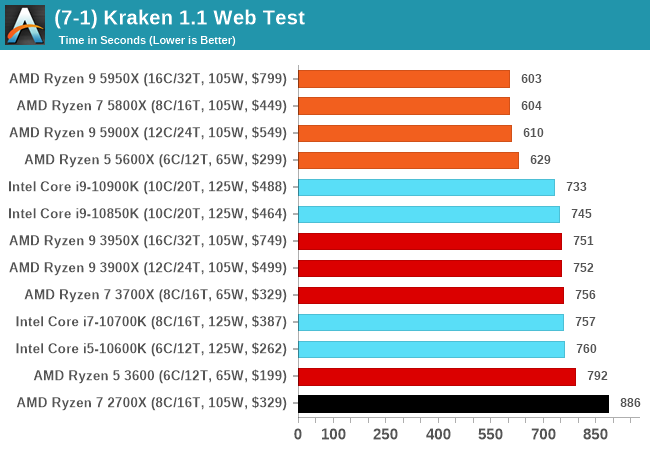
Google Octane 2.0
Our second test is also JavaScript based, but uses a lot more variation of newer JS techniques, such as object-oriented programming, kernel simulation, object creation/destruction, garbage collection, array manipulations, compiler latency and code execution.
Octane was developed after the discontinuation of other tests, with the goal of being more web-like than previous tests. It has been a popular benchmark, making it an obvious target for optimizations in the JavaScript engines. Ultimately it was retired in early 2017 due to this, although it is still widely used as a tool to determine general CPU performance in a number of web tasks.
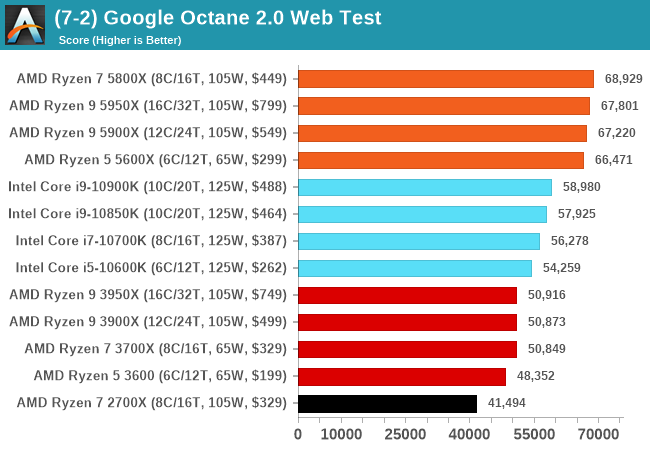
Speedometer 2: JavaScript Frameworks
Our newest web test is Speedometer 2, which is a test over a series of JavaScript frameworks to do three simple things: built a list, enable each item in the list, and remove the list. All the frameworks implement the same visual cues, but obviously apply them from different coding angles.
Our test goes through the list of frameworks, and produces a final score indicative of ‘rpm’, one of the benchmarks internal metrics.
We repeat over the benchmark for a dozen loops, taking the average of the last five.
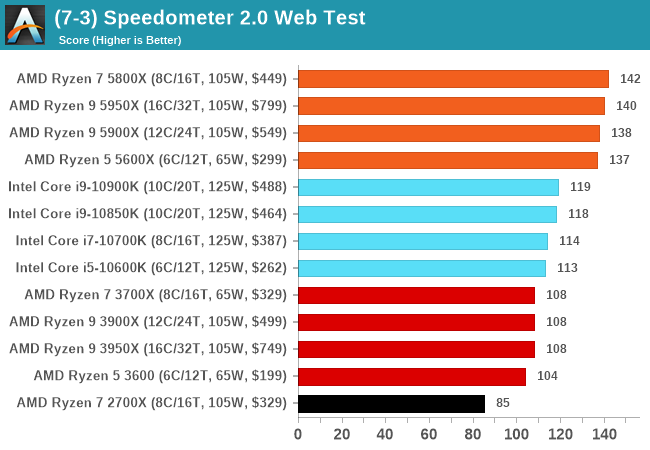
Legacy Tests
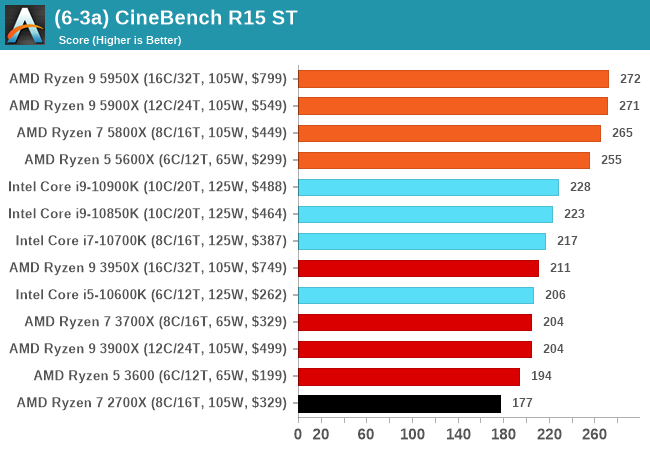
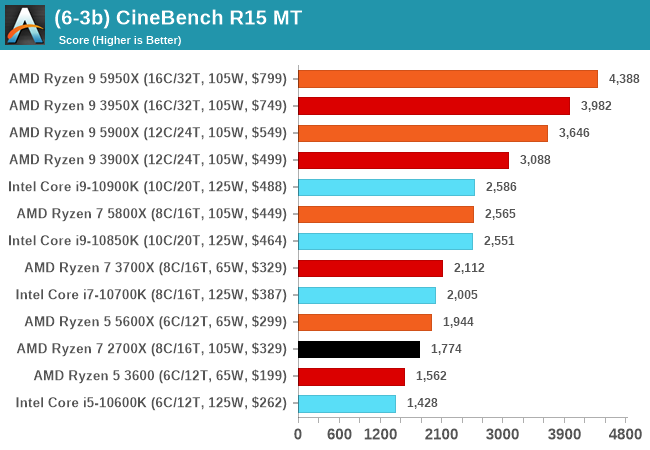
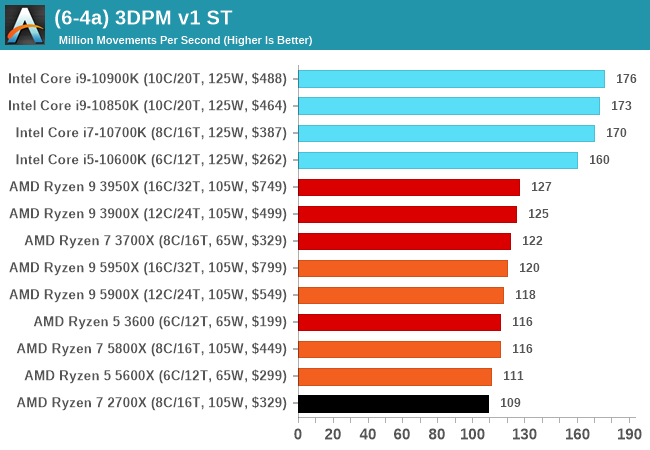
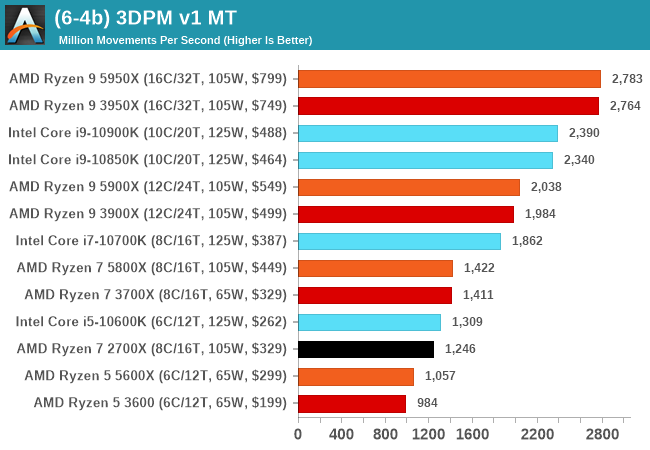


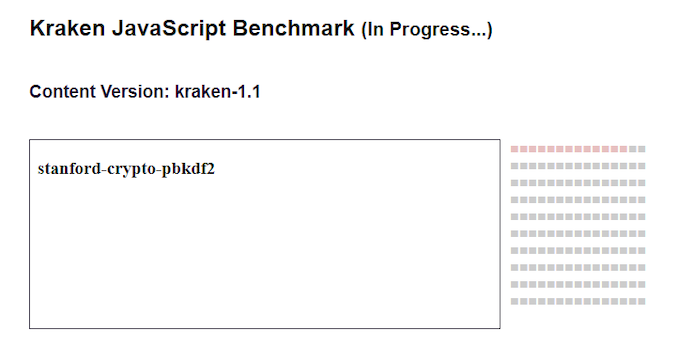
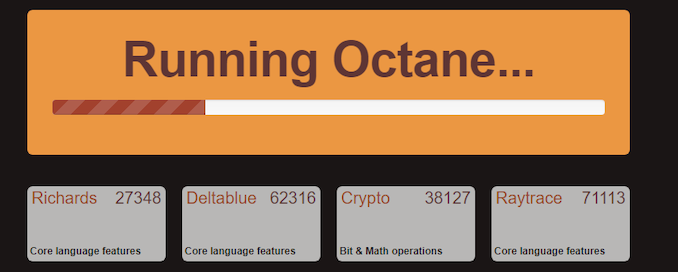
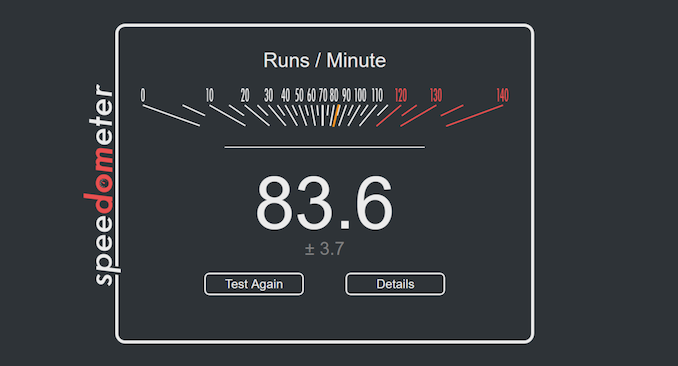








339 Comments
View All Comments
Qasar - Tuesday, November 10, 2020 - link
simple. if intel/nvidia does it, its ok, and accepted. but if amd does it ? its a crime, and becomes important.TheinsanegamerN - Thursday, November 12, 2020 - link
The leectrical costs from running intel VS amd add up to literal cents per month. If you are that concerned....you shouldnt be buying $500 CPUs.Cost of ownership really only matters, similarly, on cheap low end cars. People buying $100K+ mercedes are not particularly concerned about the price of parts or fuel, if they were they wouldnt be buying a $100K car.
Threska - Monday, November 16, 2020 - link
Funny thing my APC UPS keeps track of something like that for things plugged it. Only thing that demonstrates is that everything costs, even FUN.Spunjji - Sunday, November 8, 2020 - link
Only if you totally ignore performance per watt... You need a cooler capable of dissipating up to 250W to hit that performance, and even then, your characterisation here is garbage. Overall the 5800X is a superior product for the same price, and it's only just been released.Let the shitty, bitter takes continue!
Gigaplex - Thursday, November 5, 2020 - link
And when Intel held the performance crown, they priced their parts higher than the competition. This is to be expected. AMD only undercut on price because they couldn't compete on performance previously.LithiumFirefly - Friday, November 6, 2020 - link
They didn't just price their parts higher for nearly 25 years they just slapped $1,000 price tag on their top chip didn't matter what its performance was $1,000 that's what it was.just4U - Thursday, November 5, 2020 - link
the 5900X is nice at it's price point @ only 3-10 bucks more than the 10900K which appears to be what it's competing with.. and all the 10core parts really. The 5800X is in a odd position.. and I doubt it's going to be all that popular at that price point.Spunjji - Sunday, November 8, 2020 - link
5600 and 5700 non-X will be where it's at for value when they roll around.just4U - Monday, November 9, 2020 - link
Yeah I agree.. plus it's likely that prices will come down on these parts somewhat or be offered on sale or bundled..(saw a bit of that on launch day but they all sold out so whatever)bananaforscale - Monday, November 9, 2020 - link
"Value destroying price hike"? Sure for 3600 vs 5600X (which is *arguably* comparable), 3900X vs 5900X there's no contest. 5900X is demonstrably more than 10% faster is most cases. FWIW, I'd go for the 5800X over 10900K performance being equal because PCIe 4 and lower power draw.